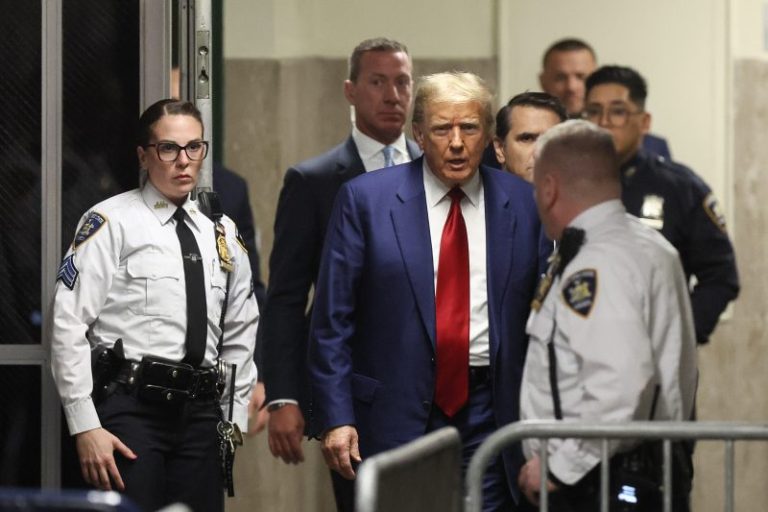It’s difficult to think of a more combustible mixture than Donald Trump and a gag order. Even with the former president’s freedom on the line, that combination is smoldering again.
After violating gag orders on at least two and arguably three previous occasions — and after a judge this week employed a novel tactic to get him to stop — Trump is flouting his latest one. He’s doing so in a way that reinforces just how much latitude he’s been given, and just how untenable that latitude might be as his various cases proceed.
The faceoff is one with increasingly profound implications not just for Trump, but for a country whose judicial system is tasked with holding him legally accountable but is taking a beating as judges try to figure out what to do.
The judge in Trump’s Manhattan criminal trial late Monday expanded Trump’s gag order in that case to include the judge’s and the district attorney’s families. New York State Supreme Court Justice Juan Merchan did so after Trump repeatedly attacked Merchan’s daughter.
Within hours Tuesday morning, Trump responded by not-subtly gesturing at the same attacks.
In a Truth Social post, Trump derided the expanded gag order while suggestively citing “conflicts taking place in his courtroom.” Trump has claimed Merchan is “compromised” because his daughter works for a Democratic-aligned digital marketing company.
The next hour, Trump posted a Fox News video that more directly echoed the attack. While Trump in the text of his post cited related comments from a legal-analyst ally, the video itself included Fox host Brian Kilmeade pointing to the same supposed conflict of interest involving the judge’s daughter that Trump has played up.
“Also, the fact is, the judge’s daughter is a[n] activist who works for Kamala Harris,” Kilmeade said in the video Trump posted, adding: “That to me is something that, if I’m Donald Trump, I’m clearly concerned about — that the judge has a daughter who feels this way.”
The video Trump promoted also featured Kilmeade surfacing a claim about Merchan’s daughter — that her social media account featured an image of Trump behind bars — that the New York court system had already moved to debunk.
Whether either of these instances will be found to violate the gag order, they are starkly reminiscent of Trump’s violating a previous order in his New York civil fraud case.
Back then, a judge ordered Trump to stop attacking his law clerk. As in the case of Merchan’s daughter, Trump had attacked the clerk to suggest bias on the part of the judge, and Trump had similarly cited debunked social media content.
In addition to his campaign’s leaving up a post attacking the clerk despite the gag order, Trump went on to cite “a person who is very partisan sitting alongside” the judge. The clerk sat beside the judge. When pressed by the judge, Trump claimed he had been referring not to the clerk but to his former lawyer Michael Cohen. But the judge found that explanation “not credible” — noting Trump has regularly attacked Cohen by name. Trump was fined a total of $15,000 for the twin violations.
(Around the same time, Trump also posted an attack on former attorney general William P. Barr after a gag order was reinstated in his federal election-subversion case preventing him from attacking potential witnesses such as Barr. Trump’s campaign said he had done so before he knew the gag order was back in effect, but the post remains live more than five months later. Trump has not been sanctioned for it.)
The financial penalties don’t appear to have dissuaded Trump, in much the same way the $86 million he owes E. Jean Carroll for defaming her doesn’t appear to have dissuaded him from continuing to attack her in the same terms.
Perhaps recognizing that — and recognizing the fact that jailing a former president and current presidential candidate for violating gag orders would be drastic and impractical — Merchan attempted a novel approach in his expanded gag order. Rather than merely threatening to fine or jail Trump if he violated the gag order, Merchan threatened to withhold the names of jurors from Trump’s legal team.
“Defendant is hereby put on notice that he will forfeit any statutory right he may have to access juror names if he engages in any conduct that threatens the safety and integrity of the jury or the jury selection process,” Merchan wrote.
The idea was apparently that this sanction could prove compelling to Trump in a way that monetary penalties and an unlikely stint in jail haven’t and wouldn’t. That’s because it bears on Trump’s ability to scrutinize would-be jurors and defend himself in the case. (Trump would surely claim that this would damage his ability to get a fair trial, but it’s not unheard of for judges to keep jurors’ identities private from litigants.)
The fact that Merchan felt compelled to employ such an unusual threat is instructive, considering how much strain Trump’s continued attacks on judges, prosecutors and witnesses have put on the legal system that will now decide his criminal fate.
But even that potential sanction doesn’t appear to have convinced Trump to operate with more care just yet. And with the stakes even greater now than they were for Trump’s civil cases — and with Trump’s Manhattan trial due to start April 15 — it’s not difficult to see this situation coming to a tense head soon.

